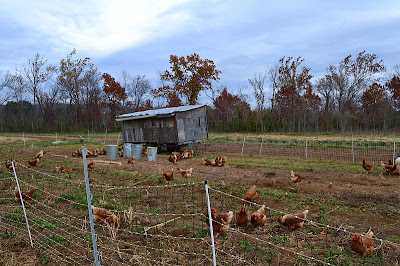As some of you may recall, a few weeks ago I attended the American Public Health Association (APHA) conference in Washington, DC. I attended sections in Food and Nutrition with names like "Farm To School Implementation," "Principles for a Healthy, Sustainable Food System," and "Farmers Markets & Fresh Produce in Urban, Underserved Communities".
Something I realized over the course of the conference was that the word "organic" was scarcely being used.* This surprised me. Given the many public health issues associated with problems like pesticide use and antibiotic resistance, I'd thought that conversation about organic agriculture would definitely be on the table.
I started to get a clue why this was the case when I talked to a woman from The Food Trust, a nonprofit in Philadelphia that works to increase fresh produce availability by creating farmers markets throughout the city. She told me that the farmers are conventional, because organic food would cost too much.
The idea that organic food is prohibitively expensive is a common one. Yes, it does cost more. And no doubt there are farmers out there who over-charge because they have customers in big cities they know will pay those prices. But overall, there are good reasons that organic food is a little more costly.
First of all, quality is an enormous factor. Organic and conventional foods are completely different products in that respect. An organic apple and a conventional apple are not the same, nor is a conventional chicken at all similar to a pastured, free-range chicken. There are fundamental nutritional differences - pastured animals have higher levels of nutrients such as omega 3 fatty acids and beta-carotene. Just compare the yolks of a grocery store egg and an organic, pastured egg - the color difference is astonishing. In his book In Defense of Food, Michael Pollan points out that by selecting produce for larger, higher producing, and more shelf stable specimens, the amount of nutrients in the produce has decreased dramatically. He says, for example, that an apple from the 1940s had three times the amount of iron as a conventionally grown apple today.
The costs of growing organically are also higher than conventional agriculture - it takes more time and more labor to be organic. (Anyone who has spent four hours hand-weeding can tell you that much.) An organic farmer who charged conventional prices would be out of work in short order. Additionally, organic certification is an expensive undertaking - farmers have to pay fees that can add up to thousands of dollars to organic certification agencies, not to mention the time they must spend organizing and filling out paperwork.
There are deeper reasons I think we're unwilling to pay extra for food in this country. Americans only spent on average 10% of their income on food in 2009, compared with 22% in 1949.We have a skewed idea of food cost due to our food production system, which externalizes costs to taxpayers in the forms of health care, workers' rights, and environmental sustainability.
When you break down the costs of organic foods to serving size amounts, it may surprise you. Check out this economic breakdown of a $100 turkey, for example - she estimates a $1.25 serving size cost when all is said and done. A $4 bunch of beets is also about $1.25 per serving. A half pound bag of lettuce mix at $6 a bag? For eight people, that's less than a dollar per serving. A soda, on the other hand, costs $1.50. A Big Mac is $4. Frankly, I call shenanigans on anyone who regularly spends $5 on a latte at Starbucks but says they can't afford fresh, local, organic produce.
Buying local/organic food does not have to cost that much. It can and should be affordable. And the best way to make it affordable is to purchase your food directly from the farmer, either through a CSA or at a farmers market.
*Of course, there are all kinds of issues about the use of the word "organic". Not all organic food is created equal - compare "industrial organic" farms in California to small, local family operations in your area. A lot of farms aren't certified organic because of the expense and the bureaucracy it involves, but if you take the time to talk to your farmers, you will often find that they do grow everything organically.














